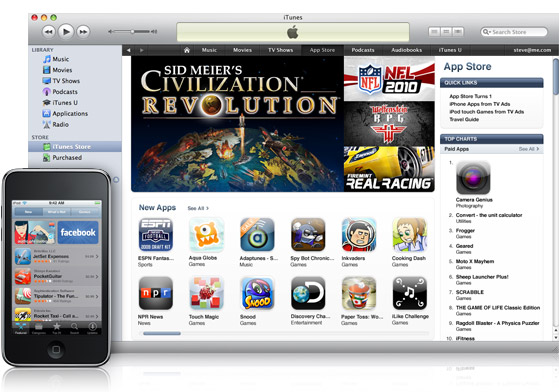FCC Chairman Julius Genachowski suggested at an FCC field hearing this week that the federal government might create its own “version of iTunes.” Multichannel News reports:

The chairman asked panelists to think about the value of a clearinghouse where best practices could be shared. He suggested that might be a way to spur the spin-off of public-sector apps from private sector initiatives and to prevent reinventing the wheel, rather than tapping into what is already being done. There is not a lot of shared info out there, he said.
If all we’re talking about is a clearinghouse that provides easy access to apps for government-developed apps, Google Code or SourceForge may be a better model than iTunes—though perhaps without the instant name recognition by ordinary consumers. Like SourceForge, Google Code allows hosting and management of open source projects, including Google’s own products. iTunes, by contrast, essentially offers consumers finished apps. Also, iTunes is a stand-alone piece of software, of which the Apps Store is just one part, while I can’t imagine why Genachowski’s “store” need be anything more than a website.
Whatever the analogy, such a “store” could well be a valuable tool for sharing the benefits of software development by government employees, both with the private sector and among federal agencies as well as state, local and even foreign governments. But what, exactly, Genachowski had in mind for the store remains awfully vague: Multichannel News mentions, as examples, “applications that do everything from monitoring heart rates and blood sugar to checking for greenhouse gas levels.” If the idea ever goes anywhere, it should be based on two principles:
- All apps should be open source and available to all users to use as they see fit.
- The store should be limited to apps developed by government employees to meet the needs of government agencies.
These principles would maximize the store’s value in making taxpayer-funded software development easily accessible. As a moral matter, it might be appropriate to limit access to U.S. taxpayers, but why bother? Attempting to authenticate users would add unnecessary complexity and raise privacy concerns needlessly: Any app we wouldn’t want to fall into the hands of, say, North Korea, simply shouldn’t be in the store at all. Sharing apps internationally would expand the potential developer base while helping to public and private sectors alike in the U.S. and abroad. If a school district in Sheboygan, WI or a village in Sudan can benefit from an app rather than starting over, so much the better for everyone!
The second requirement, combined with the open source requirement, would also help to reduce direct competition between government coders and private coders. A clearinghouse for apps government truly needs to develop on its own makes a great deal of sense: If we’re already paying a government-employee to write an app so his agency can function more effectively, that should be shared. But a broader “public option for software” could well harm both for-profit and not-for-profit development of software by the private sector. Unless its mandate were carefully constrained by statute, such a clearinghouse could easily grow into a “public works” program for the digital age, with pressure rising for government to fund software development for as a “public good.” How to draw that line would be difficult, and it’s probably not a task that should be left to the FCC; Congress should address the question.
Keeping government-developed apps open source would allow the private sector to benefit from public sector development, rather than competing with it. But if a private company wants to incorporate a government-developed app into proprietary software, they should be free to do so. The government shouldn’t be prejudicing the private sector’s choice of business models by requiring that its apps stay open source. Nor should the government prevent commercialization of software that springs from federally funded research, as currently permitted by the Bayh-Dole Act.
Perhaps the greatest danger of such a program is that it could become a vehicle for subtle government propaganda—in violation of existing laws against using taxpayer dollars to distribute propaganda inside the U.S. The iTunes store analogy is particularly inapt (no pun intended) because iTunes, of course, provides pure content as well as apps. But apps themselves could come with a particular slant because it is increasingly difficult to distinguish “pure content” from “pure apps.” This danger could be particularly acute if the store turned into a “jobs program,” which would be inherently political, just as FDR’s New Dealers used programs like the WPA Arts Project to advance a certain ideological message, and New Deal programs in general as a way of rewarding supporters and punishing opponents. We certainly wouldn’t a Republican administration, say, trying to take revenge on Google for its support of Democrats by investing public money into direct competitors to Google’s software. Nor would we want to funding for software development to become just another dimension for the culture wars.
With those important caveats, this could be a great idea.

 The Technology Liberation Front is the tech policy blog dedicated to keeping politicians' hands off the 'net and everything else related to technology.
The Technology Liberation Front is the tech policy blog dedicated to keeping politicians' hands off the 'net and everything else related to technology.